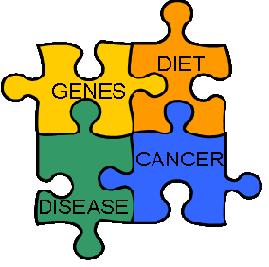|
Cancer cells are a result of environmental, dietary and infectious agents. The causative factors of cancer are many, but only a few of them have been identified. The foremost important cause of cancer is tobacco while other factors such as diet, alcohol, activity level, infections, hormones and radiation exposure are secondary contributors.
Cancer rates are exponentially on the rise and it is expected that there would be about 50% more people affected by this disease by 2020. We need to come up with flawless prevention strategies for this public health problem. Even before 35 years, researchers commented that diet contributed to almost 35% risk of an individual developing cancer. Ongoing studies since then have tried to prove that different dietary components can reduce/delay/prevent cancer development and progression. Although diet might be a major contributor for cancer risk, the exact percentage entirely depends on the type of diet consumed and the type of cancer too. We cannot tell clearly about the reaction of food, digestion process of that food, metabolism and waste elimination specifically with regards to every individual and this prevents us from recognizing the most important foods for health. Genetic variation in the way in which any food is transported and metabolized affects their impact on cancer. Exploring nutrigenetics, nutrigenomics and epigenetics can help unravel the mysteries of what type of individuals can benefit from or face a loss due to dietary changes. Other criteria, such as bacteria, virus, environment contamination and calories can have a great impact on diet-phenotype relationship. Don’t be surprised to know that we have already achieved a milestone in genetics by making genetic testing available for more than 1,700 diseases. Also, pharmaceutical testing is fast emerging as a reliable method to check the success rate of a particular drug, but this has not yet been achieved in the stream of nutrigenetics. Availability of database to use this genetic information and develop personalized strategies is the need of the day. Copy number (genome repeats) might also affect the response to diet to as much as 25%. Further study is needed in this area as well in the field of gene polymorphism and deletions to pinpoint the reason behind the risk variations and how exactly they affect cancer process. The entire load cannot be placed over genomic and epigenomic processes to affect the impact of dietary factors on phenotypic changes as alterations in the rate of transcription genes can be critical for cellular processes. Also, bioactive food components (essential and non-essential nutrients) can affect gene expression and their impact on gene transcription and translation is time dependent. But, these can prove useful when it comes to picking individual food components that can affect one or more food processes, which includes those involved in the risk of cancer development and tumor behavior. Excess body weight and physical inactivity account for nearly one-fifth to one-third of many of the different cancers, especially that of the colon, breast, endometrium, kidney and esophagus. Though numerous studies link breast, colon, prostate, liver and lung cancer to dietary intakes, the role of nutrigenetics in the field of cancer cure/therapy needs further research. In-depth research in this field can help realize nutritional needs of an individual based on genetic profile and can also help in curing chronic diseases. Comments are closed.
|
AuthorDietitian & Nutritionist Dr. Nafeesa Imteyaz. ArchivesCategories |
- Home
- Written Testimonials
- Consult
- Clinics
- Blogs
-
Diet & Nutrition
- Diabetes Reversal
- IVF IUI not needed for PCOS PCOD Infertility
-
Medical Nutrition
>
-
Disease & Conditions
>
- Infertility | PCOS
- Diabetes Mellitus
- Cholesterol
- Hypothyroid
- Kidney Problems
- Hypertension
- Cardiovascular Diseases
- Liver Diseases
- Gastro intestinal disorder
- Cancer
- Metabolic Disorders
- Orthopedic Disorders
- Eating Disorders
- Dietary Recall
- Weight Record Filled By Clients
- Online Payment Transaction Details
- Online Clients Weight Check Form
- Our Program Package Service Charges
- Weight Record 2017 Clients
- Measurements sent by Clients
- Terms & Conditions Of Payment
- Thanks. Your Form is Submitted
- Video Testimonials
- Lifestyle & Wellness
- Lifestyle & Wellness Blog
- Allergy & Intolerance
- Weight Loss / Gain
- Weight Loss / Slimming Blog
-
Disease & Conditions
>
- Life Cycle Nutrition >
- Sports Nutrition >
- Integrity in Nutrition
- Knowledge Centre
© COPYRIGHT 2022. ALL RIGHTS RESERVED. FRST HEALTHCARE PVT LTD.
Dr. Nafeesa Imteyaz of First Eat Right clinic, is the Best Dietitian Nutritionist in Bangalore. Best Dietitian Nutritionist in Pune. Best Dietitian Nutritionist in Hyderabad. Best Dietitian Nutritionist in Chennai. Best Dietitian Nutritionist in Mumbai. Best Dietitian Nutritionist in Delhi. Best Dietitian Nutritionist in Kolkata.

